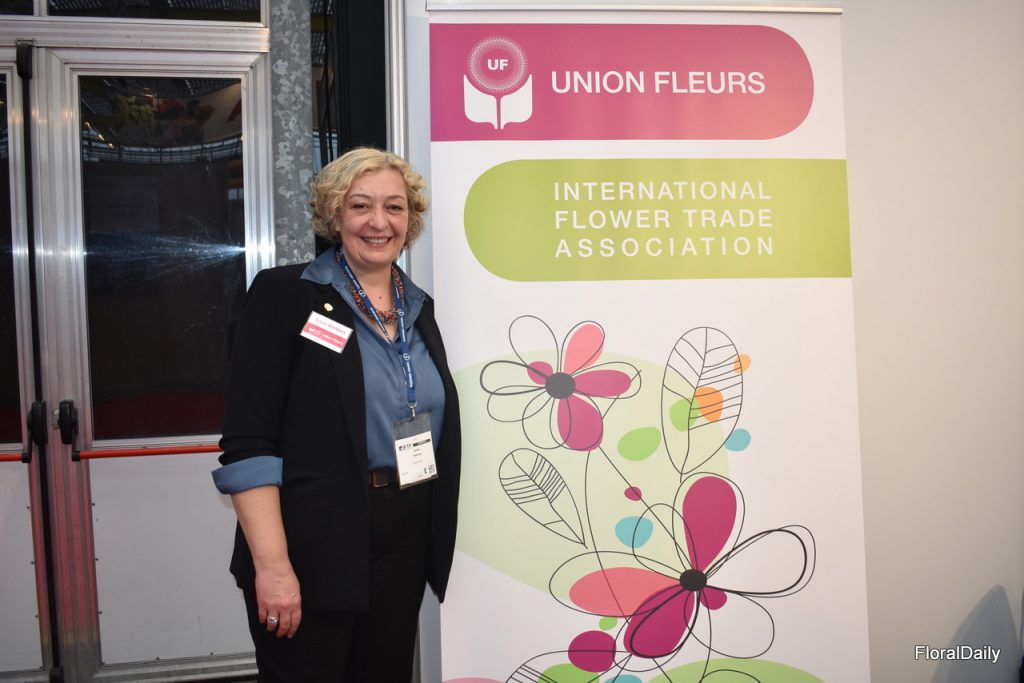

“The most important thing is to treat sustainability as a strategic core business driver rather than a regulatory burden.” — Sylvie Mamias, Secretary General, Union Fleurs.
When the European Union unveiled its Green Deal in 2019, it was hailed as Europe’s boldest response yet to the Paris Climate Agreement. But for global industries intricately tied to EU markets, floriculture included, the legislation is more than a distant political promise. It is becoming a business reality.
At the AIPH Industry Conference, Sylvie Mamias, Secretary General of Union Fleurs, spelled it out: the EU’s sustainability legislation is moving fast, it is binding, and it will redefine how flowers and plants reach consumers across Europe and beyond.
Union Fleurs, representing over 3,000 companies and more than 80% of the world’s cut flower and pot plant trade, has a vantage point few others can claim. From the greenhouses of the Netherlands to farms in Kenya, Colombia, and Ethiopia, the organization sees the ripple effects of Brussels’ policymaking in real time.
And Mamias’s warning was clear: sustainability must be treated as a strategic driver of business value, not just a compliance headache.
The Green Deal: Turning Policy into Obligation
The Green Deal is not simply environmental legislation. Its ambition is sweeping: climate neutrality by 2050, a circular economy, biodiversity protection, pollution reduction, and a better quality of life for citizens.
For floriculture, three pieces of legislation stand out:
- Packaging and Packaging Waste Regulation (PPWR): Coming into force in August 2026, this law requires recyclability and reuse by design, critical for flowers and plants, which rely heavily on plastics.
- Corporate Sustainability Due Diligence Directive (CSDDD): Extends responsibility deep into international supply chains, requiring oversight of human rights and environmental practices at every level.
- Corporate Sustainability Reporting Directive (CSRD) & Sustainable Finance Disclosure Regulations (SFDR): Expand transparency obligations, reshaping how companies account for sustainability in financial terms.
Each represents a profound cultural shift: sustainability moving from the margins of corporate reporting into the core of business operations.
What makes it transformative, Mamias emphasized, is the pivot from voluntary frameworks to mandatory obligations. In other words, sustainability reporting, packaging rules, and supply chain due diligence are no longer “nice-to-haves”, they’re becoming requirements for doing business in the EU.
Timelines
- 2019: EU Green Deal launched
- 2024–2025: CSRD reporting obligations begin for large companies
- 2026 (August): PPWR (Packaging & Packaging Waste Regulation) enters into force
- Late 2020s: Gradual rollout of biodiversity restoration & pesticide reduction measures
- 2050: EU target of full climate neutrality
A Sector Under Pressure
For growers and traders, the near-term picture is daunting. Compliance brings added costs—whether through greenhouse retrofits, energy-efficient lighting, labor condition audits, or certifications.
“Margins are already razor-thin,” noted a rose exporter from Colombia. “When you add compliance costs, it can feel overwhelming. But if we invest wisely, better energy systems, smarter logistics, it could also make us more resilient in the long term.” Kenyan growers, too, are weighing the implications.
“For us, the CSDDD is the real game changer,” said, Farm manager at a Naivasha-based flower farm. “It forces us to document labor practices, water use, and pesticide reduction in a way that is both transparent and verifiable. That requires investment, but it also helps us prove our value to buyers.”
Top 3 Risks for Growers
- Rising Costs: Investments in compliance, energy, and labor standards squeeze margins.
- Supply Chain Scrutiny: Human rights and environmental due diligence may expose weak links.
- Market Exclusion: Non-compliant suppliers risk being locked out of EU markets.
Opportunity in Disguise
Here lies the paradox: while the Green Deal pushes costs upward, it also levels the playing field and accelerates innovation.
Stricter logistics and packaging rules may initially constrain exporters, but they also promise more efficient cold chains, less waste, and higher-quality products arriving at market.
Dr. Pieter de Vries, an EU policy analyst in Brussels, framed it this way: “The Green Deal is not about punishing industries, it’s about future-proofing them. The companies that adapt now will be the ones still in the market ten years from now.”
Consumer demand is already shifting in Europe, with retailers under pressure to verify supply chain sustainability.
Speaking to Floriweek, A sustainability officer at a German supermarket chain, said: “Our buyers increasingly ask: what’s the carbon footprint of this bouquet? Were workers treated fairly? If suppliers can’t answer those questions, we’ll go to the ones who can.”
Opportunities for Exporters
- Premium Positioning: EU buyers willing to pay more for verified sustainable products.
- Innovation Push: Demand for smart greenhouses, biocontrols, and water recycling.
- Market Access Advantage: Early adopters build stronger, longer-term contracts with retailers.
Sustainability as Strategy, Not PR
Mamias’s strongest appeal was for companies to move past defensive thinking. Instead of treating legislation as an unavoidable box-ticking exercise, firms should see it as an opportunity to integrate sustainability into their value proposition.
That means embedding environmental and social goals into strategy, building robust data systems, and adopting life-cycle thinking, from the farm to the consumer’s vase. Transparency is no longer just about reporting, it’s about trust, competitiveness, and survival.
“We need to stop thinking of sustainability as marketing,” argued Wanjiku. “It’s operations, finance, HR, logistics, it touches everything.”
Collaboration as a Competitive Edge
One recurring theme in Mamias’s address was the importance of collective action. The Floriculture Sustainability Initiative (FSI), launched in 2013, has already helped companies align on sustainability benchmarks. The industry’s involvement in developing the EU-endorsed Product Environmental Footprint (PEF) methodology is another example of proactive cooperation.
Martijn van Os, a Dutch grower and FSI member, explained: “Pre-competitive initiatives are the only way forward. No single company can bear the cost of innovation alone, but if we set shared standards, everyone benefits, including the consumer.”
